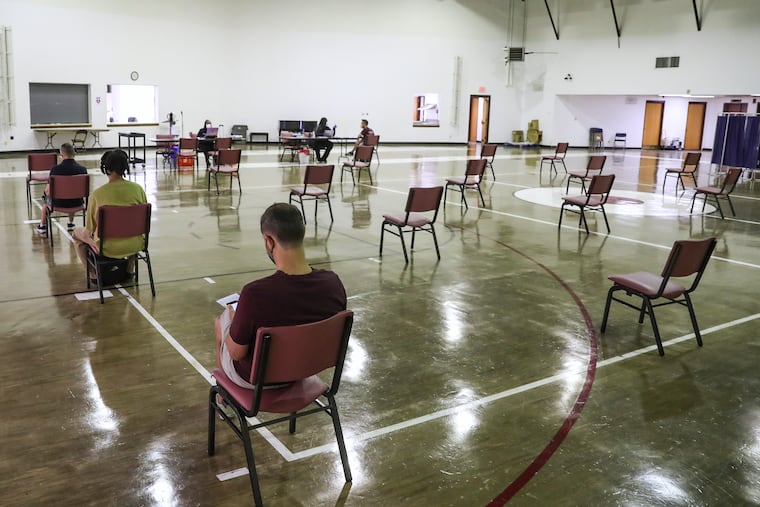Strobe lights, tequila shots, and ... monkeypox vaccine? Some Philly nightclubs may add doses to the menu
Nightclubs and event venues may be the latest front in Philadelphia in the fight against monkeypox.

The Philadelphia Department of Public Health plans to make the monkeypox vaccine available during busy hours at city clubs and nightspots within the next month, the city’s health commissioner said.
The initiative comes amid the city’s ongoing struggle to get vaccines to the people most at risk from the virus, predominantly men who have sex with men. Case counts in the city have declined since this summer, but the Health Department is concerned that vaccines have reached fewer than half of the number of people needed for immunity in the community.
“We’d love to not have another endemic infection in Philadelphia,” said Philadelphia Health Commissioner Cheryl Bettigole in an interview Thursday.
Working with businesses to encourage vaccination among people enjoying a night out is unusual, Bettigole said.
“The goal is to take a vaccine clinic where people are,” Bettigole said. “Let’s be there when the club’s open and operating.”
» READ MORE: Monkeypox vax has disproportionately gone to white Philadelphians. This clinic sought to balance that.
In recent weeks, the Health Department has been reviewing 22 applications, more than expected, for 10 grants that will give a total of $375,000 to community groups to promote vaccination. Officials also have conducted outreach to venues and businesses that cater to the LGBTQ community with the hope of pairing community groups and these businesses to coordinate vaccination outreach.
The city has broadened its eligibility for vaccination to make it easier to get shots to bisexual, gay, and trans men who have sex with men and are at risk of encountering the virus.
The initiative will likely convince some to get a shot, said Jeremy Taylor, a party promoter who has been distributing information about monkeypox vaccination at his events.
“The biggest thing is having it available and accessible,” said Taylor, who hosts events under the name JayLaTay.
Twenty new cases were reported in Philadelphia the week of Sept. 11, the most current weekly data available, compared to 70 in the last week of July.
» READ MORE: Here’s how to find monkeypox vaccines in Philly, Pa., N.J.
Even as fewer cases are being reported, an increasing percentage of them are showing up in Black Philadelphians, according to city data. Just over a month ago, 55% of Philadelphians infected with the virus were Black. That has grown to 61%, even though the city’s Black population makes up about 43% of its residents. Yet Black people have received just 27% of the vaccine doses.
City health officials have estimated that about 12,000 Philadelphians are at high risk of contracting monkeypox, Bettigole said. Only about 6,400 doses have been administered, the city’s vaccination data shows. That number doesn’t distinguish between those who have received one or two doses, so the real number of vaccinated people is smaller.
Distrust is an issue in vaccination rates
City health officials are aware they aren’t well-trusted in many of the city’s disadvantaged communities, Bettigole said, noting that the health department was initially rebuffed by some of the businesses they hoped to include in the vaccination outreach effort.
Experts say the racial disparities seen in the current monkeypox outbreak stem from the same distrust, mistreatment, and systemic bias in health care that caused the city’s Black residents to be hit harder by COVID and less likely to be vaccinated against it.
“There is a disproportionate number of people of color being affected by COVID, being affected by monkeypox, being affected by heart disease,” said JaBaris Swain, a doctor and medical director at the Dr. Ala Stanford Center for Health Equity. “Our focus is try to identify the stop gaps and see what we can do to try to bridge that gap.”
» READ MORE: Black Philadelphians are at higher risk of monkeypox but get just a fraction of vaccine doses
The North Philadelphia health center continues to host monkeypox vaccination clinics on Wednesdays, he said, but they don’t draw large numbers of people. This week’s clinic administered 10 to 12 vaccinations, Swain said.
His organization has already received one of the health department grants, he said, and is coordinating efforts with businesses in the city to hold vaccination clinics.
The city had hoped its grants would be reimbursed by the federal government, but health officials learned this week that an emergency spending bill proposed by congressional Democrats did not include money for COVID or monkeypox. The city was prepared, though, and core programs won’t be affected, Bettigole said.
“In Philadelphia, we have sort of concluded a while ago we couldn’t count on the cavalry to come,” Bettigole said.